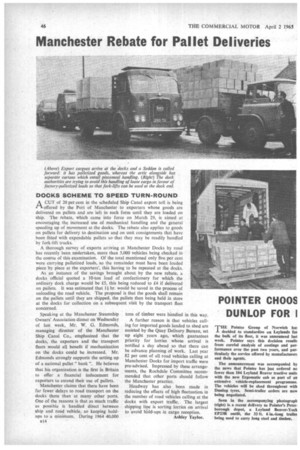Manchester Rebate for Pallet Deliveries
Page 48

If you've noticed an error in this article please click here to report it so we can fix it.
DOCKS SCHEME TO SPEED TURN-ROUND ACUT of 20 per cent in the scheduled Ship Canal export toll is being offered by the Port of Manchester to exporters whose goods are delivered on pallets and are left in such form until they are loaded on ship. The rebate, which came into force on March 29, is aimed at encouraging the increased use of mechanical handling and the general speeding up of movement at the docks. The rebate also applies to goods on pallets for delivery to destination and on unit consignments that have been fitted with expendable pallets so that they may be readily handled by fork-lift trucks.
A thorough survey of exports arriving at Manchester Docks by road has recently been undertaken, more than 5,000 vehicles being checked in the course of this examination. Of the total mentioned only five per cent were carrying palletized loads, so the remainder must have been loaded piece by piece at the exporters', this having to be repeated at the docks.
As an instance of the savings brought about by the new rebate, a docks official quoted a 10-ton load of confectionery for which the ordinary dock charge would be £.5, this being reduced to £.4 if delivered on pallets. It was estimated that hr. would be saved in the process of unloading the road vehicle. The proposal is that the goods shall remain on the pallets until they are shipped, the pallets then being held in store at the docks for collection on a subsequent visit by the transport fleet concerned.
Speaking at the Manchester Steamship Owners' Association dinner on Wednesday of last week, Mr. W. G. Edmonds, managing director of the Manchester Ship Canal Co., emphasized that the docks, the exporters and the transport fleets would all benefit if mechanization on the docks could be increased. Mr. Edmonds strongly supports the setting up of a national pallet " bank ". He believes that his organization is the first in Britain to offer a financial inducement for exporters to extend their use of pallets.
Manchester claims that there have been far fewer delays to road transport on the docks there than at many other ports. One of the reasons is that as much traffic as possible is handled direct between ship and road vehicle, so keeping holdups to a minimum. During 1964 40.000 tons of timber were handled in this way.
A further reason is that vehicles calling for imported goods landed to shed are assisted by the Quay Delivery Bureau, set up eight years ago, which guarantees priority for lorries whose arrival is notified a day ahead so that there can be advance planning of work. Last year 82 per cent of all road vehicles calling at Manchester Docks for import traffic were pre-advised. Impressed by these arrangements, the Rochdale Committee recommended that other ports should follow the Manchester practice.
Headway has also been made in reducing the effects of high fluctuation in the number of road vehicles calling at the docks with export traffic. The largest shipping line is sorting lorries on arrival to avoid h■.ald-ups in cargo reception.
Ashley Taylor.


































































































































































